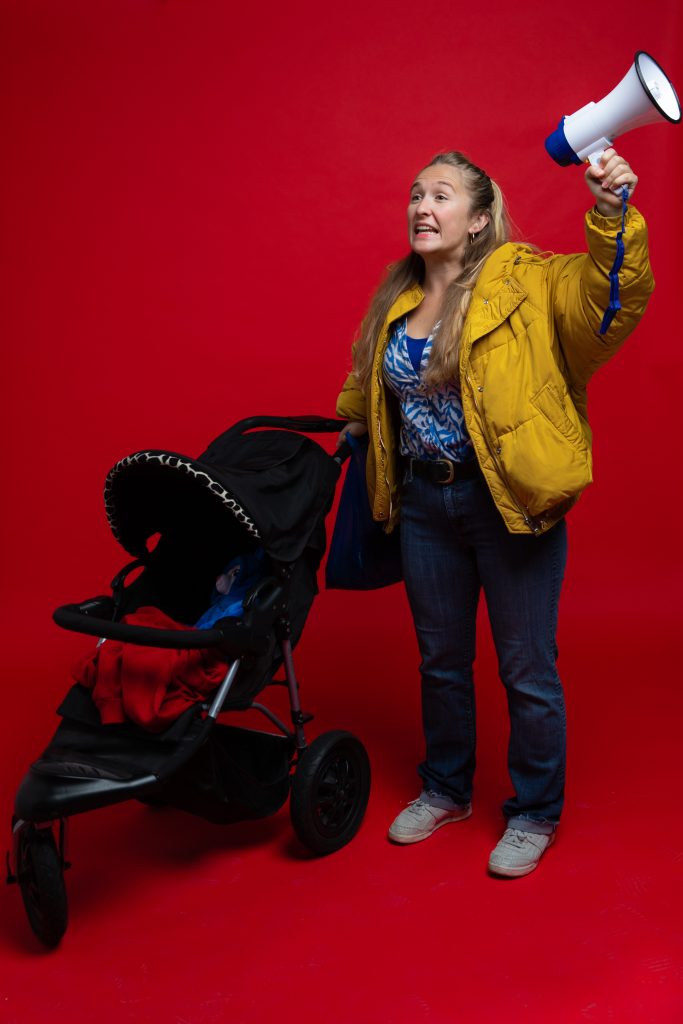
‘All animals are equal, but some animals are more equal than others‘ George Orwell.
 (3 / 5)
(3 / 5)
Humane, written by Polly Creed and directed by Imy Wyatt Corner, is about the real protests against live animal exports from British ports in the town of Brightlingsea, Essex in 1995, in which a cross-section of the population took to the main road where a lorry regularly transported live animals in inhumane conditions.
Colette Zacca plays Alice and Francesca Isherwood plays Linda, two protesters who bond. Alice is, according to the script, a mixed-race schoolteacher and Linda is a white stay-at-home mum. The first half shows their friendship slowly grow, mostly through sharing their worries about their children. The characters speak on landline phones, facing the audience, about Alice’s older teen son Michael and Linda’s young baby. Both women are somewhat isolated, with Alice living alone and Linda’s husband on a tour of Bosnia. There’s nice attention to detail in the 90s costumes (I’m pretty sure I used to own the pink and turquoise shell jacket worn by Linda) and nostalgic 90s-style soundtrack, designed by Anna Short. While it lacked momentum, there was a compelling sweetness to their mutual nervousness about making a new friend.
Video footage, news reports and interviews with protestors are intercut with the action, successfully reminding us this was a real part of our recent history and foreshadowing further environmental protests that have taken place over the last couple of years. Only one section jars – when the actors speak over the ‘news reports’ – also voiced by actors – and it’s impossible to decipher the separate lines of speech.
Police brutality is hinted at, along with the idea that no-one is wholly good or moral. The central premise, that activism should be intersectional and that you can’t support one ‘good’ cause but not another, seems somewhat flawed – we pin our flag to different causes and people are complex – a racist can be a great animal rights campaigner, as was the case in this story. There’s an interesting flick over racism and allyship that feels as though it should be seeded or foreshadowed earlier; it could have been alluded to in the first half but it’s interesting and effective when we see it destroy the friendship in the second half.
It’s sometimes hard to work out what specifically ties this moment in history to modern-day themes, or to a larger picture beyond that specific event in 1995.
Colette Zacca (aka viral twerking sensation “Dancing Granny“) seems unconfident in her performance and fumbles over quite a few lines, until the final moments on the theme of racism when she seems to get into her stride. The program notes additional writing by her, so possibly these are the parts she wrote and they are very powerful.
This went out as a very successful audio drama during lockdown, with a different cast and crew, and I’ve given it a listen. The audio story is more detailed and features more characters and voices in the movement. It feels richer, with an easier flow between archive footage and drama. It is also only mentioned late on that Alice is mixed-race – thereby subtly leading listeners to question their own biases, whereas the impact of this is obviously lost when you can see the actor from the beginning in the stage version. Writer Polly Creed addresses issues of race and racism with sensitivity in both forms, I just wish she had been bolder in exploring this essential question about how strong friendships forged through a common passion can be.
